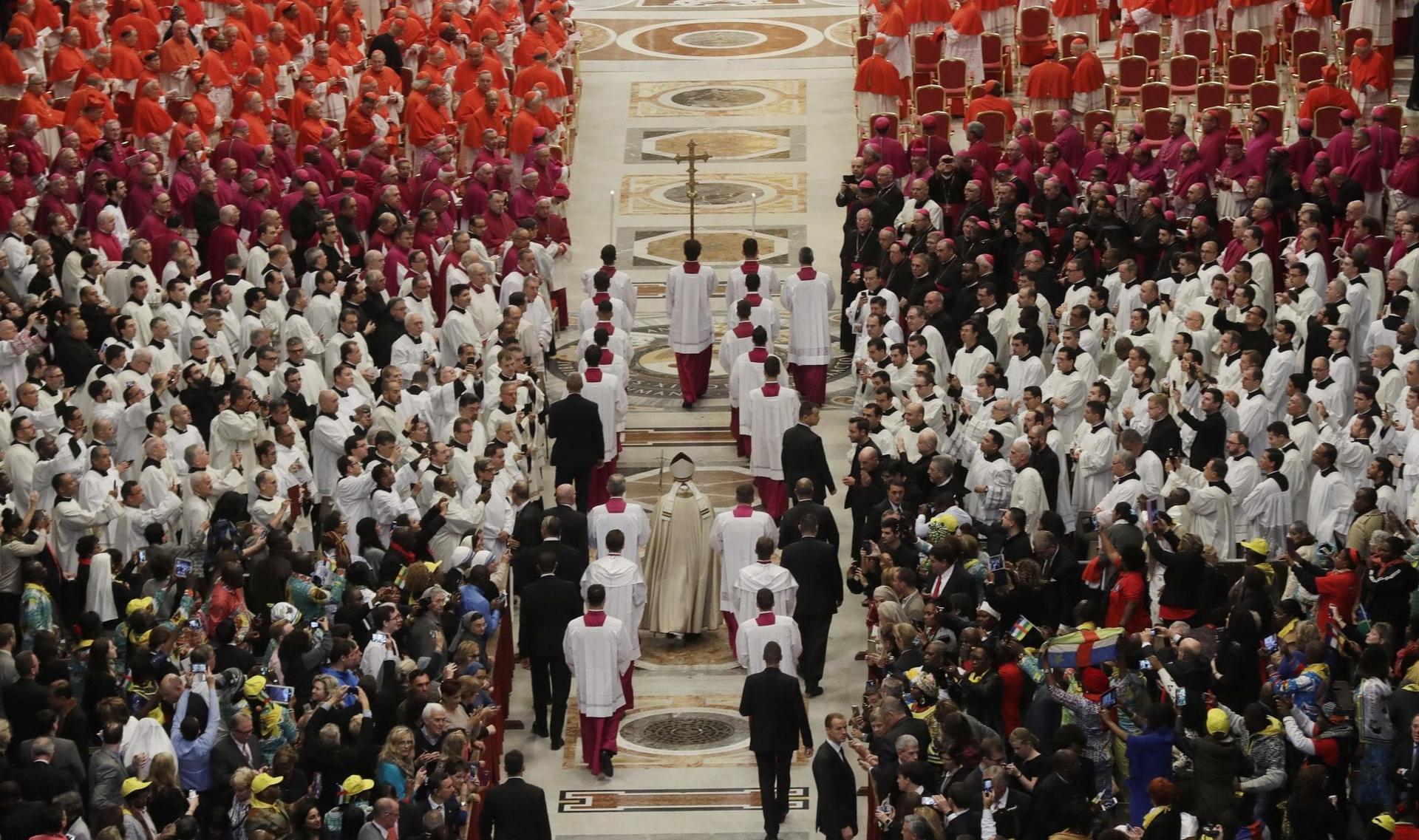ROME— Surrounded by a culture of growing “polarization and exclusion,” Pope Francis on Saturday called for newly created cardinals not to allow the “virus” of division to affect the way they think or act, because in-fighting would compromise the universality of the Church.
“We live at a time in which polarization and exclusion are burgeoning and considered the only way to resolve conflicts,” Francis said on Saturday, as he was elevating 17 new men to the College of Cardinals.
Today, the pope said, the “stranger,” such as immigrants or refugees, are seen as a “threat, take on the status of an enemy.”
Enemies, he said, because they come from distant lands or have different customs, different skin color, languages or social class. Enemies because of different faiths.
And “without our realizing it” this animosity rooted in differences “turn into symptoms of hostility, threats and violence.”
As a result, wounds grow deeper because of this “epidemic of animosity and violence,” which affects the defenseless the most “because their voice is weak and silenced by this pathology of indifference!”
Although the pope’s horizons seemed to be far broader than intra-Catholic disputes, inevitably his words are likely to be heard against the backdrop of tensions within the Church he leads. In recent days, bishops have engaged in public crossfires over the pope’s document on the family, Amoris Laetitia, and a small group of conservative cardinals has even floated the idea of a public “correction” of the pontiff.
“How many situations of uncertainty and suffering are sown by this growing animosity between peoples, between us!” Francis said. “Yes, between us, within our communities, our priests, our meetings.”
This virus of polarization and animosity, the pope regretted, permeates “our way of thinking, feeling and acting.”
Addressing the College of Cardinals, Francis said that even they, as well as himself, are not immune from this virus, and need to make sure these attitudes of division don’t “find a place in our hearts,” because it would be contrary to the richness and universality of the Church.
The over two hundred members of the Catholic Church’s most exclusive club come from all over the world, every continent but Antarctica. The 17 created on Saturday alone come from 11 different countries, including three from the United States.
The Church’s universality, Francis noted, is tangible also in the College of Cardinals: “We come from distant lands; we have different traditions, skin color, languages and social backgrounds; we think differently and we celebrate our faith in a variety of rites.”
“None of this makes us enemies; instead, it is one of our greatest riches,” he said.
God, Francis said, showed the apostles, “and ourselves,” the way: “Be merciful, even as your Father is merciful.”
This call to mercy, he continued, is accompanied by four commands, molding the apostle’s vocation through everyday situations, shaping and making tangible the path of discipleship: love, do good, bless and pray.
These four, Francis said, are easily applicable to “our friends and for those more or less close to us, people we like, people whose tastes and habits are similar to our own.”
Jesus, the pope continued, is very clear on to whom these four things are to be done for: “[Jesus] minces no words, he uses no euphemisms. He tells us: love your enemies; do good to those who hate you; bless those who curse you; pray for those who mistreat you.”
Talking to the College of Cardinals gathered in Rome for the consistory for the creation of new cardinals, from where his successor will eventually be chosen, Francis insisted that these four commands do not come spontaneously when dealing with people “we consider our opponents or enemies.”
“Our first instinctive reaction in such cases is to dismiss, discredit or curse them,” the pope said. “Often we try to ‘demonize’ them, so as to have a ‘sacred’ justification for dismissing them.”
In God’s heart, Francis said in his homily, “there are no enemies,” because he only has sons and daughters. “We are the ones who raise walls, build barriers and label people.”
The pontiff closed his prepared remarks telling the prelates that their goal is to strive, “together with the People of God,” to become persons “forgiveness and reconciliation.”
Today, he urged them, they’re called to realize that if something should disturb them, it’s the fact that “so many of our brothers and sisters are living without the strength, light and consolation born of friendship with Jesus Christ, without a community of faith to support them, without meaning and a goal in life.”
After the consistory ended, in which each new cardinal received their episcopal ring and red birreta from the pope, the prelates, together with Francis, got into mini-vans and went to the Mater Ecclesiae monastery on Vatican grounds, to greet emeritus Pope Benedict XVI.
The last two times Francis held a consistory, his predecessor had attended the ceremony.













